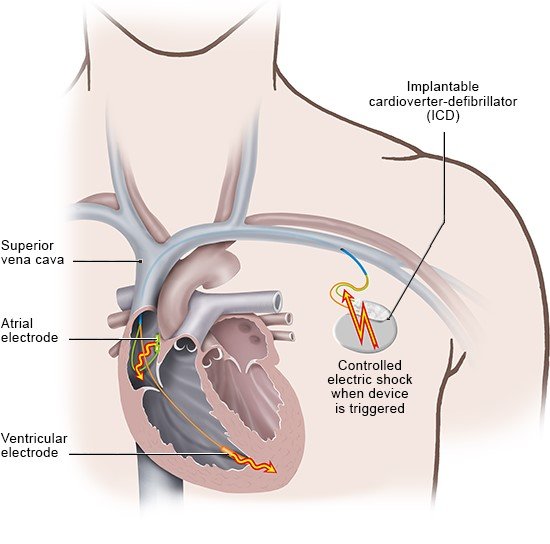Benstoem C, Kalvelage C, Breuer T et al. Ivabradine as adjuvant treatment for chronic heart failure. Cochrane Database Syst Rev 2020; (11): CD013004.
Bundesärztekammer (BÄK), Kassenärztliche Bundesvereinigung (KBV), Arbeitsgemeinschaft der Wissenschaftlichen Medizinischen Fachgesellschaften (AWMF). Nationale Versorgungsleitlinie Chronische Herzinsuffizienz. AWMF-Registernr.: nvl-006. 2019.
Butler J, Usman MS, Khan MS et al. Efficacy and safety of SGLT2 inhibitors in heart failure: systematic review and meta-analysis. ESC Heart Fail 2020; 7(6): 3298-3309.
Cao Y, Li P, Li Y et al. Sodium-glucose cotransporter-2 inhibitors in heart failure: an updated meta-analysis. ESC Heart Fail 2022; 9(3): 1942-1953.
Glikson M, Nielsen JC, Kronborg MB et al. 2021 ESC Guidelines on cardiac pacing and cardiac resynchronization therapy. Europace 2022; 24(1): 71-164.
Ivynian SE, Newton PJ, DiGiacomo M. Patient preferences for heart failure education and perceptions of patient-provider communication. Scand J Caring Sci 2020; 34(4): 1094-1101.
Karimi-Dehkordi M, Clark AM. Views of Patients With Heart Failure on Their Value-Based Self-care Decisions: A Qualitative Study. J Cardiovasc Nurs 2020; 35(6): E89-E98.
Kraai IH, Vermeulen KM, Hillege HL et al. "Not getting worse" a qualitative study of patients perceptions of treatment goals in patients with heart failure. Appl Nurs Res 2018; 39: 41-45.
Maagaard M, Nielsen EE, Sethi NJ et al. Ivabradine added to usual care in patients with heart failure: a systematic review with meta-analysis and trial sequential analysis. BMJ Evid Based Med 2022; 27(4): 224-234.
Martin N, Manoharan K, Davies C et al. Beta-blockers and inhibitors of the renin-angiotensin aldosterone system for chronic heart failure with preserved ejection fraction. Cochrane Database Syst Rev 2021; (5): CD012721.
McDonagh TA, Metra M, Adamo M et al. 2021 ESC Guidelines for the diagnosis and treatment of acute and chronic heart failure. Eur Heart J 2021; 42(36): 3599-3726.
Turgeon RD, Barry AR, Hawkins NM et al. Pharmacotherapy for heart failure with reduced ejection fraction and health-related quality of life: a systematic review and meta-analysis. Eur J Heart Fail 2021; 23(4): 578-589.
IQWiG health information is written with the aim of helping people understand the advantages and disadvantages of the main treatment options and health care services.
Because IQWiG is a German institute, some of the information provided here is specific to the German health care system. The suitability of any of the described options in an individual case can be determined by talking to a doctor. informedhealth.org can provide support for talks with doctors and other medical professionals, but cannot replace them. We do not offer individual consultations.
Our information is based on the results of good-quality studies. It is written by a team of health care professionals, scientists and editors, and reviewed by external experts. You can find a detailed description of how our health information is produced and updated in our methods.


